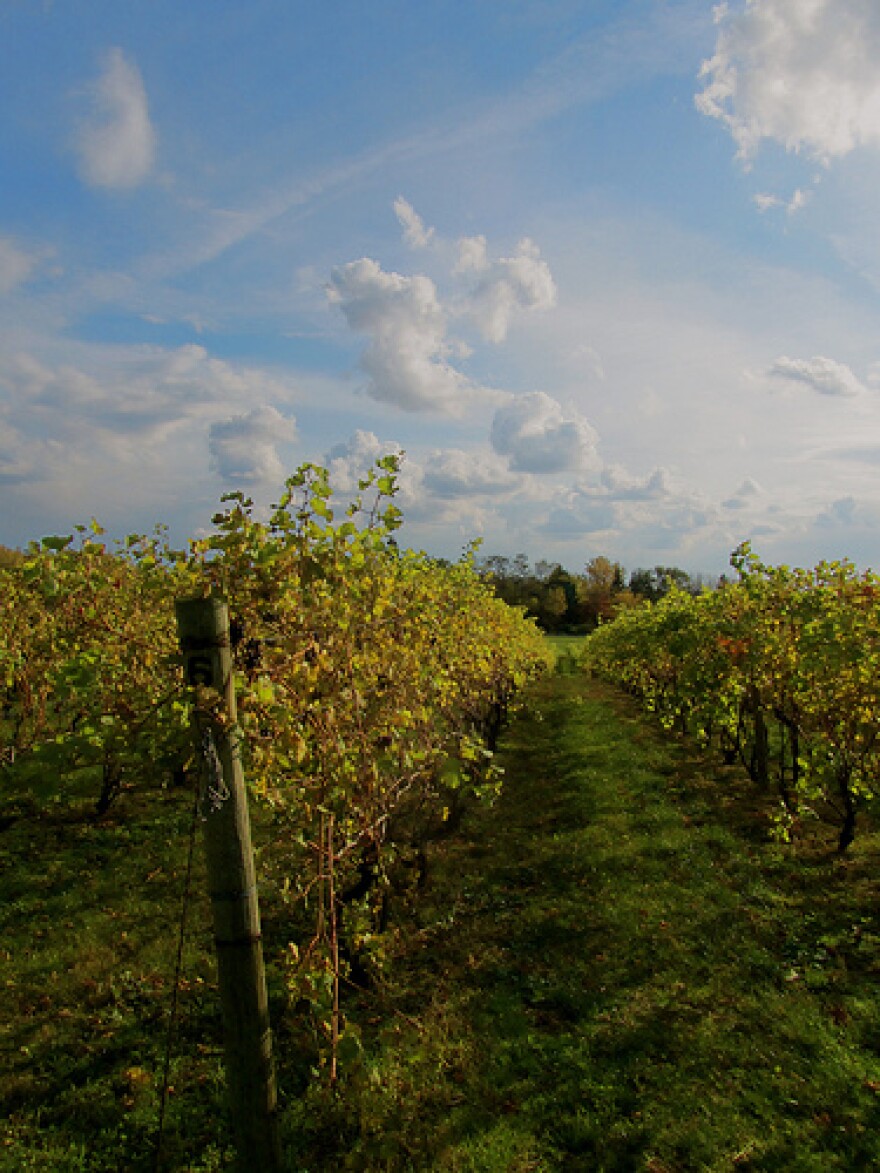2012 will go down as an "annus horribilis" for most fruit-growers in Michigan. Apples, cherries, pears have been hit hard by the big March warm-up followed by a spring frost, then a hot, dry summer.
But if you are a wine producer in Michigan, you might be feeling happier about the weather we've had this year!
Eddie O'Keefe is the President of Chateau Grand Traverse Wines on the beautiful Old Mission Peninsula.
There was a lot of nail biting amongst growers early in the season said Mr. O’Keefe.
“To go from 90 degrees to three feet of snow on the ground a few days later,” O’Keefe said.
But O’Keefe says conditions normally detrimental to growers may actually be a benefit this year. He grows his grapes on sandy, gravelly soil that drains well, so when temperatures did drop there was not much standing water to freeze.
“Our vines remained pretty much in good shape,” O’Keefe said.
Though the nail biting continued as the risk of a spring frost remained through May, O’Keefe says growers were able to eke out the spring without any issues.
Cyndy wondered if the summer’s hot, dry weather was any better than rainy weather.
“Hot dry weather develops the sugar in the grapes, but if it goes for an extended period of time the grapes will eventually just shut down. They will just do nothing. With temperatures above 90, the vines just kind of go into a survival mode. So really, below 90, ample rain is what we need,” O’Keefe said.
If the sugars increase, Cyndy asked, would that mean the wine you make is going to be a little bit better?
“There is never an easy answer in wine making, warm weather develops sugar and cooler evenings maintain the acidity of the fruit. To give you an example— if you bite into an unripe apple, that’s acidity; if you bite into an overripe apple, that’s sugar so you want to find it right at that midpoint,” O’Keefe said.
Warm weather develops sugar; cool weather maintains the acidity, and that’s where we’re kind of trying to find the balance.
"It sounds like you’re going to have a good year, but don’t want to jinx it," Cyndy said.
O’Keefe is cautious but willing to guess that it will be an excellent year, especially for red wines and richer wines such as chardonnay. The warm weather should produce wines with a lot of body.
“With regard to the traditional wines we produce such as Riesling and things like that it’ll be a good year for late harvest and sweeter style wines,” O’Keefe said.
“The crisper, lighter style wines might not be the best this year. I’m certainly not saying they are going to be bad, but they’re not going to be at their optimum.”
When asked about how he got into the wine business, O’Keefe mentioned the great influence of his father.
“He was a very entrepreneurially spirited guy who was everything from a gym teacher to an insurance salesman to an FBI agent to a Green Beret Army paratrooper,” O’Keefe said. He decided to get into the wine business back in the early seventies and thought Northern Michigan could be the place.
“Most experts said you cannot grow grapes in Northern Michigan, and low and behold, that’s just what an entrepreneur needs to hear— that you can’t do something--so he started a winery where none existed,” O’Keefe said.
Today there are nearly 30 wineries in the Traverse City area, O’Keefe reported.
After college, O’Keefe decided he would follow in his father’s footsteps and began working at the winery in 1985. Chateau Grand Traverse was just a small winery at the time, producing only 4,000-5,000 cases of wine a season, but it kept growing and this year O’Keefe is anticipating about 110,000 cases of product.
Cyndy wanted to know from O’Keefe which wine he was most excited about.
“Some of the red wines from 2011 have yet to be bottled, and they are going to be excellent. From the wines this year we have a gamet, which is a French, red wine variety which will be excellent and of course always look for the late harvest Riesling. It should be one of the best years ever.”
There are two ways you can podcast "Stateside with Cynthia Canty"








